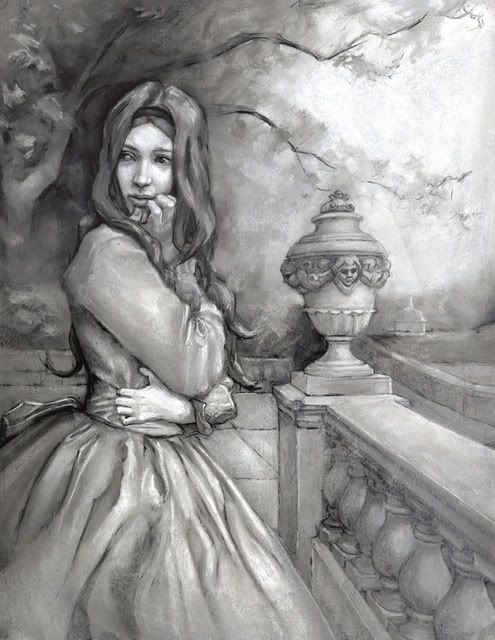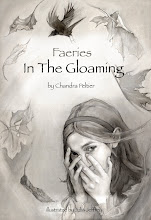
Greetings, folks! Above you will find Julia Jeffrey's cover mock-up for my book (which, like all of Julia's work, I completely adore!), Faeries in the Gloaming, and an excerpt introducing the character of Robin. Because the hobgoblin had attempted to disguise himself as a Martinware bird jar, Robin currently finds himself trapped in that form due to a fairy artifact that the children's father popped inside him just prior to vanishing. Uncle Ned and the children, unaware that the bird "jar" is alive, believe that the artifact is connected to the father's disappearance. Since Eliza's dreams center on a mermaid, Uncle Ned theorizes that the phases of the moon, so associated with the tides, might have some affect on the bird "jar", and decides to place it in a window to see if the fullness of the moon can trigger a reaction.
…a loud thud woke Eliza, and she sat up with a start. Barely aware that her brother and uncle had awakened as well, Eliza stared in fascination at the bird jar. Thinking that it must be a cloud passing over the face of the moon that had caused the momentary illusion of movement, Eliza let out a muffled scream as she watched in horror as the bird jar turned his head to look at her.
"Good Heavens!" exclaimed Uncle Ned, as he and Alfred scrambled to their feet.
"Please do not be alarmed on my account," the bird calmly replied. "I believe that you were looking for a result. I hope that I do not disappoint!"
"Do not engage the creature in conversation, Eliza," thundered Uncle Ned, "until I have had an opportunity to examine it!"
"I am a he not an it," the crow said in a rather wounded tone, "and my conversation has always been regarded as engaging!" With this remark the crow attempted to bow as an additional flourish, but his wings refused to cooperate and the effect was not pleasing.
"It appears to be alive." Uncle Ned circled the crow with a half wondering, half terrified expression.
Curiosity had by now overcome fear in both children, and they crept closer to their uncle and the ruffled and undeniably live creature.
"Of course I am alive, you nitwit, in spite of your repeated attempts to spear me with all manner of iron keys!" the crow snapped. "Is this how you treat all of your guests? No one has thought to inquire about my needs, or to offer me a bite to eat!"
"Impertinent creature!" growled Uncle Ned.
"Marvelous," breathed Eliza.
"Now see here," said Alfred sternly. "What have you done with our Father?"
"The proper question," replied the crow "is 'What has your father done to me?'. I am a hobgoblin, a shape shifter by nature. The moment your father popped that object inside me, I have been stuck in this ungainly body. I cannot shift back!"
The bird gave them all such a reproachful look, that Eliza felt compelled to apologize, "I am sorry, and I'm sure that my father did not do so intentionally," she said in a soothing tone. "And I think that you are a lovely bird."
"Well, don't give the creature airs," Uncle Ned said in disgust, as the crow began to preen with ill-concealed vanity.
"Tell us why you were here in the first place," Alfred demanded, "and tell us your name!" Alfred was attempting to look threatening, despite his rumpled nightclothes and hair that currently resembled a frightened hedgehog.
"Manners," chided the crow. "One never asks for another's name, very rude."
"Why ever not?" Alfred said irritably. He was secretly wondering if they should try breaking the crow jar one last time by smashing it against the wall.
"Because," Uncle Ned replied slowly, "knowing a fairy's true name gives one power over the creature."
"We have not had any practical experience in dealing with fairies," Eliza explained apologetically, "only theoretical. May I ask how you prefer to be addressed?"
"This one I like much better, her good breeding is evident," the crow said, tilting his head at Eliza. He drew himself up and said with obvious pride, "As your Shakespeare once said, 'I am that merry wanderer of the night', known more commonly as Robin Goodfellow, liege man to His Majesty King Oberon, High King of all who dwell in Faerie. For those who find favor with me, they may call me Puck!"
Eliza, well familiar with the hobgoblin called Puck from William Shakespeare's fairytale play A Midsummer-Night's Dream, that tricksey character capable of either acts of kindness or of leading hapless human victims astray. She and her uncle regarded the crow with speechless astonishment. Alfred's reaction was completely different. The crow's announcement caused Eliza's brother to dissolve into giggles.
"I fail to see," said the crow coldly, "the humor in anything that I have said."
"This is the first time," Alfred said, laughter bubbling up again, "that I have ever met a crow named Robin!" That said, Alfred clutched his sides and hooted hysterically. The crow literally bristled, his feathers nearly standing on end in irritation.
Before the conversation could devolve much further, Uncle Ned had recovered enough to insist, "You still have not explained your business here! As a member of Oberon's court I find your presence, so soon after the disappearance of my nephew, highly suspicious!"
"I would be happy to answer your questions," said the crow, now known as Robin, "provided that you supply me with some vittles, preferably some eggs and b.! I've not had a decent breakfast for weeks!"
"He means eggs and bacon," Eliza said before Alfred could ask. She glanced out of the window to see light creeping into the morning sky. The salmon pink dawn vaguely reminded her of her dream. "It's frightfully early," she said, "but I imagine that we could convince the cook to make us some food. I believe that we could all do with a good breakfast."
 In this scene Uncle Ned learns more about the faerie in his family tree from one of the locals, Captain Selkirk, the grandson of the area's last seanachaidh, or storyteller.
In this scene Uncle Ned learns more about the faerie in his family tree from one of the locals, Captain Selkirk, the grandson of the area's last seanachaidh, or storyteller.




